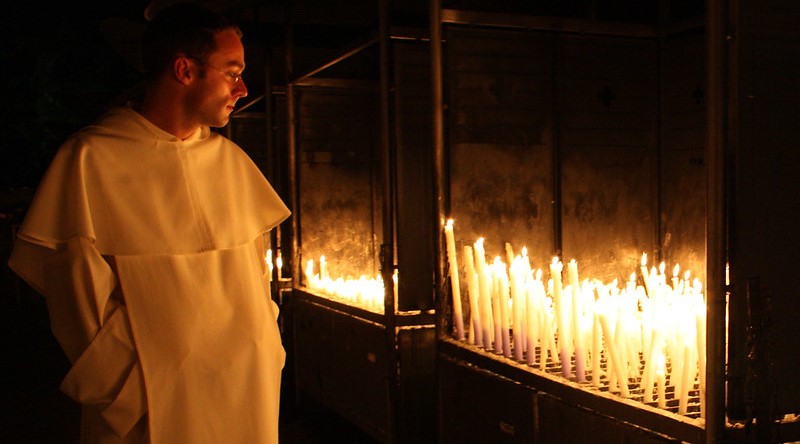Candles burn. It’s what they are made for. If a candle should sit unburned, forever, we would say that it never achieved its end.
You, too, are made to burn. Not in the same physical way as the candle, but in a way that lets the candle act as a sacramental. Like the candle, we are all made to burn with and be consumed by God’s love and light.
The candles we offer at Mass today are sacramentals in many ways. In addition to the symbolism of light and the connection drawn with Simeon’s recognition of the lumen ad revelationem gentium, the candles are a symbol of our very lives. We can follow Saint Anselm in seeing the blessed candles as a sacramental of the Christian life: the wax is our humanity, the wick is our soul, and the flame is the divine life present in us. As the candle is consumed by the flame, so too must our lives be consumed by the flame of divine charity burning in our very souls. It is a fire that consumes, but never destroys what is most true to our being (Exod 3:2–3; 1 Cor 3:15).
Like the different candles in the sanctuary, we burn with different degrees of intensity and splendor, each for God’s definite purpose. Some will burn brilliantly for only a short span, and others will shine diffusively to fill the whole Church. Some carry the divine light out of the Church into the world, while others are called to burn by the tabernacle in the silence of the cloister. The manner in which we burn should not trouble us, as long as it is the divine flame for which we spend our fuel.
Burning is not comfortable, and we should not expect the real fire of divine charity to burn any less than the material flame that consumes the candle’s wax. God’s love is a refiner’s fire, burning away all the impurities that keep us from loving God as we ought to. It is easy for us to become caught up with the ancillary concerns of life and to forget about the real purpose of our existence, our true end. The Baltimore Catechism reminds us simply that God made us “to know Him, to love Him, and to serve Him in this world, and to be happy with Him forever in heaven.” We are made, in essence, to exist in a relationship of love with God. We reach this end by the fire of charity kindled and sustained in our hearts. Charity is the virtue that unites us to God in love and orders all our actions to the perfective end of friendship with God in Heaven.
In the same way that fire must be introduced to the candle from an external source, the fire of divine love comes first of all from God, through grace. But, unlike the candle, God has allowed us the terrifying freedom to resist this divine fire or to snuff out the flame of charity by our sins. But, ultimately, we can only choose when and not whether we burn.
One day, our life on earth will end. On that day we will be judged by whether or not we accepted the divine flame into our heart, our soul, and our mind. If we do not burn with divine love in this life, we will be cut off from that fire of divine love to face the fires of Hell (Isa 33:13–16).
Christ came in the flesh so that we may see the glory of God’s love, the light that shines in the darkness. He came in our flesh, as a little child, so that—like Simeon—we might recognize that light and be kindled with the flame of his divine love (Luke 12:49). We are able to love him because he came to love us. “Therefore, we who are receiving the unshakable kingdom should have gratitude, with which we should offer worship pleasing to God in reverence and awe. For our God is a consuming fire” (Heb 12:28–29).
✠
Photo by Fr. Lawrence Lew, O.P. (used with permission)







